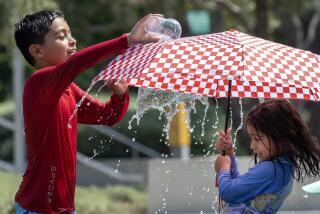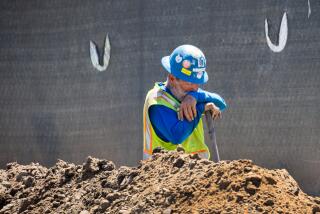Heat Hazard : Experts Say High Temperatures Hit the Elderly Especially Hard
- Share via
On days when the temperature rises to scorching and the two fans that he found in a trash bin can’t cool his apartment, 74-year-old Lavhan Watson gets in his Buick, drives across the street and parks the car in the coolest spot he can find.
“I came over here just to get out of there,” Watson said, standing in the shade of a sign on Sepulveda Boulevard across from his North Hills apartment. “It’s hot in there--plus I get claustrophobic.”
And sometimes the heat takes an even greater toll on him. “I get depressed awful easy,” he said, sipping on a water bottle.
Watson is not alone.
Medical experts say older people are particularly vulnerable to extreme heat. The biggest danger is heatstroke, a sharp increase in body temperature that can lead to faintness, loss of consciousness or even death, said Dr. Richard Minter, director of geriatrics at Encino-Tarzana Regional Medical Center.
And as the temperature rises, older people in particular should take precautions to avoid heatstroke and other heat-related problems.
“It’s pretty deadly if you aren’t treated right away,” Minter said. “The elderly have less margin of error for their physiology.”
At the Pacoima Multipurpose Senior Citizens Center, staff members have cautioned members about the heat and how to survive it.
“We’re encouraging them to keep calm, stay inside as much as possible and drink plenty of liquids,” said the Rev. Alicia Broadous-Duncan.
Ironically, the advice takes on greater importance to senior citizens using the Pacoima center because each day of searing heat forces them to make a difficult choice.
They can spend their days at the center, eating lunch, exercising, playing bingo with their friends--and sweltering in rooms that aren’t air-conditioned.
Or, they can stay alone in their homes--cooler and more comfortable--but without the camaraderie and activities they find at the center.
“I’d rather come up here than stay at home,” said 82-year-old Sarah Casstevens, sitting at a lunch table Wednesday afternoon. “Why should I stay home and look at four walls? . . . It would be nice if we had air conditioning here.”
But the heat may be keeping many more in their homes. At noon Wednesday, only seven people sat down in the lunchroom for a meal of roast beef, broccoli, mashed potatoes and lemon pudding.
Normally about 50 people show up to eat each day, site manager Virgia Bryant said.
The room where center members eat lunch is not air-conditioned, nor is the room that houses the center’s day-care program for older people with Alzheimer’s disease and dementia.
The heat was so bad one day, she sent everybody home.
“It’s so unfair to this population,” said Broadous-Duncan, her face glistening with sweat. “It’s not conducive for them to come, but they come anyway because this is their outlet.”
Dr. Don Jong, assistant emergency room chief at Kaiser Foundation Hospital in Woodland Hills, said persistent hot weather often aggravates the condition of people with health problems.
About five such patients a day have shown up at the hospital since the heat wave began. Authorities said they have seen few serious heat-related problems so far, but that could change if the heat continues.
At the Pacoima center, workers and volunteers have phoned all homebound and particularly frail senior citizens to check on their conditions, Broadous-Duncan said.
Those who attend the center will continue to choose between companionship and comfort for at least a few more weeks--or until the heat spell ends. The center was scheduled to move into a new air-conditioned building this week, but because of building delays that date has been pushed back.
More to Read
Sign up for Essential California
The most important California stories and recommendations in your inbox every morning.
You may occasionally receive promotional content from the Los Angeles Times.













